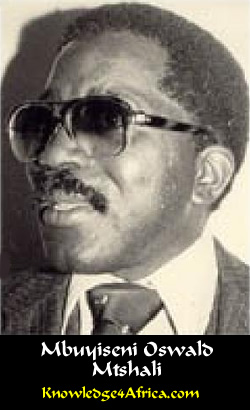|
READ THIS
The poet examines the birth of Shaka in an epic fashion, seeing aspects of his birth as revealing powerful
omens for the future king.
 ABOUT THE POET
ABOUT THE POET
Mbuyiseni Oswald Mtshali was born in Vryheid (Natal) in 1940, where he grew up and completed his
schooling.
He desired thereupon to attend Wits University but was unable to do so because the Apartheid laws
forbade Black people studying at "White" institutions except under exceptional circumstances.
Instead, he travelled to the United States where he attended Columbia University, graduating with a
Masters degree in Creative Writing and Education.
On his return to South Africa, he completed his first volume of poetry which he called Sounds of a
Cowhide Drum. It was published in 1971 and had a dramatic impact because it was the first major
work by a Black poet in South Africa.
It was also eagerly studied by liberal White South Africans who were anxious to read poetry from their
Black brothers. The anthology, however, was criticised by fellow Black poets on the grounds that it was
too conservative and not at all militant.
When Mtshali published Fireflames in 1980, he had responded to his critics. Indeed, this second
anthology tended to foster open rebellion, being partially inspired by the Soweto youth uprisings of 1976.
After this second anthology, Mtshali settled down as an educator, first at Pace College in Soweto where
he became vice-principal, and then at the New York City College of Technology where he became an
Adjunct Professor, teaching African folklore and modern African history.
In 1971 Mtshali was honoured with South Africa's prestigious Olive Schreiner Poetry Prize. In 1973 he
was awarded the Poetry International Award in London.
Have you looked at the questions
in the right column?
|
TEST YOURSELF!
Read the left column and then answer
the following questions:
"His baby cry
was of a cub
tearing the neck
of the lioness
because he was fatherless."
- What is a metaphor? Identify the metaphor in this stanza and explain what it is that is being compared
to what? (4)

[Need help?]
A metaphor is a direct comparison in which a thing is said to be what it is being compared to.
In this stanza, the baby's cry is compared to the cry of a lion cub. It is a metaphor because the poet says
that the baby's cry IS that of the lion cub. He does not say it was merely LIKE the cry of the lion cub, which
would have made it a simile.
|
- What word tells us of the savage nature of the baby's first cry? (1)

[Need help?]
"Tearing the neck of the lioness."
|
- Who would the "lioness" represent? (1)

[Need help?]
The lioness is Shaka's mother, Nandi.
|
- How would the newborn Shaka know that he was fatherless? (2)

[Need help?]
In reality, he wouldn't have known this but the poet is using poetic license here, claiming that the savagery
of the baby's cry was because he was fatherless.
|
"The gods
boiled his blood."
- What is the significance of the gods having "boiled his blood"? (2)

[Need help?]
The expression "he made my blood boil" means "he made me very, very angry".
By boiling his blood in his veins, therefore, the gods gave Shaka an anger and a determination in life.
|
"Ancestors forged
his muscles . . . and nerves."
- What is the purpose of the poet's reference to the ancestors? (2)

[Need help?]
The ancestors play a significant part in African tradition. They are the spirits of the dead who have real
power to interfere in a person's life or the life of a community. This interference can be for good or for ill.
In this case, the ancestors were said to be there at Shaka's conception, creating his powerful muscles and
sharp nerves.
|
"His eyes were lanterns
that shone from the dark valleys of Zululand
to see white swallows
coming across the sea."
- What is the significance of comparing Shaka's eyes to lanterns? (2)

[Need help?]
Lanterns are portable lamps which shine up areas of darkness. Is this a reference to Shaka's later
wisdom?
|
- What are the "white swallows"? Why has the poet used the metaphor
"swallows". (4)

[Need help?]
The "white swallows" are the white colonists. Swallows fly in from another country usually far away.
They arrive in a group, with many together in a flock. They immediately build their nests and colonise the
place.
|
- Is "white swallows" a derogatory or insulting phrase? (4)

[Need help?]
One could argue this either way but it would appear to be generally a neutral expression. It simply gives
metaphorical meaning which describes how the white settlers arrive and what they did. It does not appear
to condemn the settlers -- after all, swallows are not guilty because they migrate.
|
"Lo! you can kill me
but you'll never rule this land!"
- What is the historical significance of the words "you'll never rule this land!"? (4)

[Need help?]
Shaka was indeed a ruler and remained a ruler until he was assassinated. His two assassin brothers, on
the other hand, lead uncertain lives, forever having to defend themselves against a powerful enemy. They
were never successful rulers as such.
|
|



